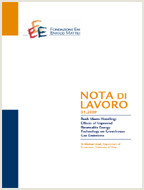Freight Futures: The Potential Impact of Road Freight on Climate Policy

13.02.2017
Q54, Q58, R41
Road Freight, Transport, Climate Mitigation, Integrated Assessment Models
Mitigation, Innovation and Transformation Pathways
Massimo Tavoni
Transportation Research Part D: Transport and Environment, vol. 55, August 2017, pages 359-372
This paper describes changes to the modelling of the transport sector in the WITCH (World Induced Technical Change Hybrid) model to incorporate road freight and account for the intensity of freight with respect to GDP. Modelling freight demand based on the intensity of freight with respect to GDP allows for a focus on the importance of road freight with respect to the cost-effective achievement of climate policy targets. These climate policy targets are explored using different GDP pathways between 2005 and 2100, which are sourced from the Shared Socioeconomic Pathways (SSPs) database. Our modelling shows that the decarbonisation of the freight sector tends to occur in the second part of the century and the sector decarbonises by a lower extent than the rest of the economy. Decarbonising road freight on a global scale remains a challenge even when notable progress in biofuels and electric vehicles has been accounted for.
***
Suggested citation: Samuel Carrara, Thomas Longden, Freight futures: The potential impact of road freight on climate policy, Transportation Research Part D: Transport and Environment, Available online 17 November 2016, ISSN 1361-9209, http://dx.doi.org/10.1016/j.trd.2016.10.007.
